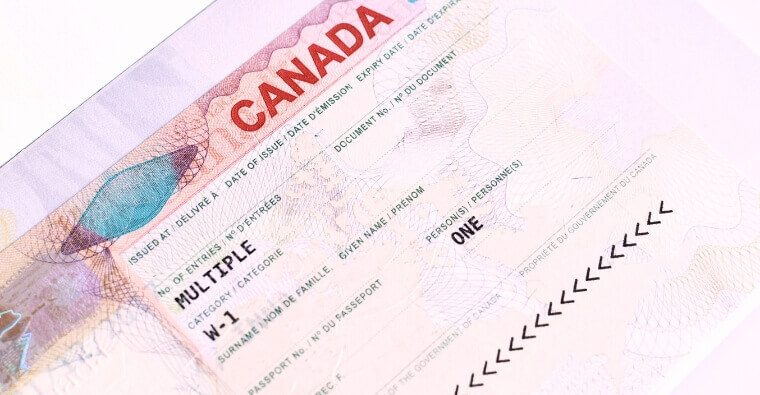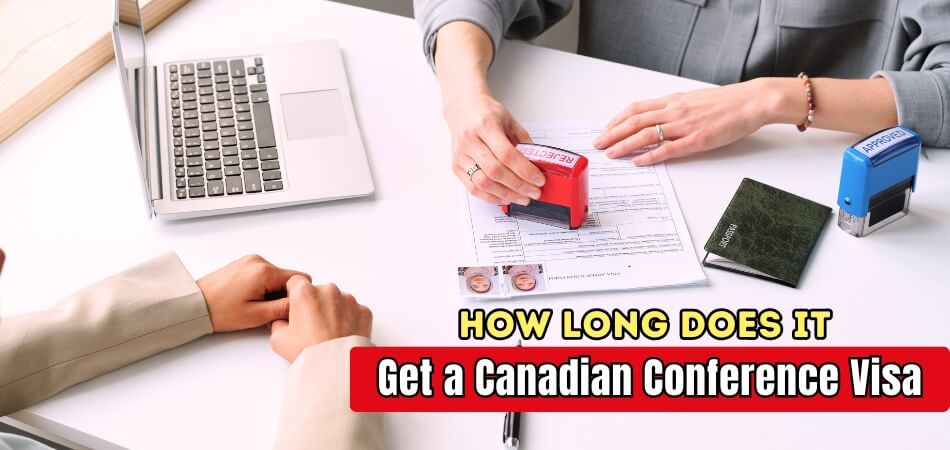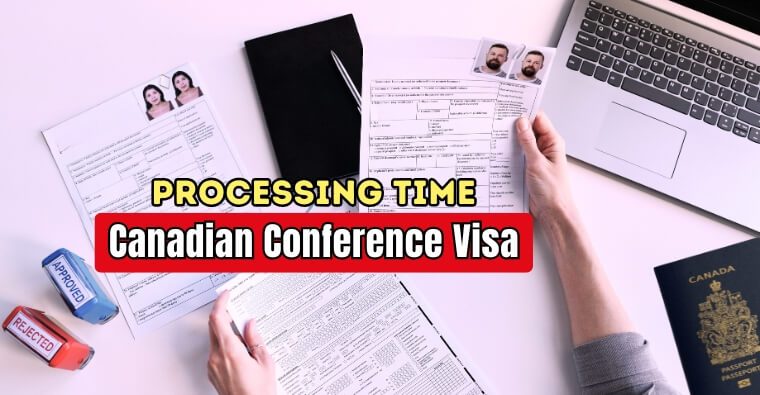Professionals hoping to increase their knowledge and network may find that attending a conference in Canada offers an exciting opportunity. However, for international visitors, understanding the visa requirements is crucial. You might be wondering, “How long does it take to get a Canadian conference visa?” This question is essential for planning your trip effectively.
The processing time for a Canadian conference visa can vary based on several factors. Typically, a complete application can take about 2 to 4 weeks to process. However, depending on the type of visa, time of year, and country of application, it may take longer, sometimes up to 8 weeks or more.
Still curious about the Canadian conference visa processing time? This article provides all the necessary details about Canadian conference visas, including requirements and tips for a smoother experience. Dive in to learn more and ensure you’re well-prepared for your conference trip!
Canadian Conference Visa: Why Do You Need One?
Being present at a Canadian conference can provide numerous opportunities for networking, learning, and professional development. However, international visitors often need to navigate specific visa requirements to enter Canada for such events. A visa ensures compliance with Canadian laws and regulations, allowing you to attend without legal complications.

The Canadian conference visa process involves submitting an application and providing necessary documentation. This includes proof of your registration for the event, travel itinerary, and financial means to support your stay. Gathering all required documents ahead of time is essential to avoid delays or issues during your travel.
If you’re planning to attend a business conference in Canada with invitation letter, it is crucial to include this document in your visa application. This invitation letter serves as proof of your participation and can significantly strengthen your case for obtaining the visa you need for your trip.
Types of Canadian Conference Visa You Can Get
Participating in a conference in Canada requires understanding the appropriate visa options available. Knowing which visa suits your needs is essential for a smooth journey. Below are the different types of Canadian conference visas you can obtain.
Temporary Resident Visa (Visitor Visa)
The Temporary Resident Visa (TRV), commonly known as a Visitor Visa, is required for individuals from countries that are not visa-exempt. This visa allows you to enter Canada for a short period, typically up to six months, for purposes such as attending conferences or meetings. You must apply before traveling and meet all the eligibility criteria set by Canadian immigration authorities.
Electronic Travel Authorization (eTA)
Foreign nationals visiting Canada by air who do not require a visa must obtain an Electronic Travel Authorization (eTA). It is electronically linked to your passport and valid for up to five years or until your passport expires. If you are from an eTA-eligible country and plan to attend a conference in Canada, you must obtain an eTA before boarding your flight.
Business Visitor Status
Entering Canada under the Business Visitor category is possible for business travelers attending conferences. While this is not a separate visa, it specifies the activities you are permitted to engage in while in Canada. You may need a TRV or eTA, depending on your nationality, but as a business visitor, you do not require a work permit if your activities are limited to attending conferences.
Work Permit for Conference Speakers
If you are speaking at a conference or performing work-related services, you may need a work permit. Certain activities beyond attending as a participant require authorization. A work permit allows you to legally work in Canada for a specific period. It’s important to verify whether your role at the conference necessitates a work permit to ensure compliance with immigration regulations.
Transit Visa
A transit visa is needed if you are passing through Canada on your way to another country and are from a visa-required country. Even if you are not staying in Canada, you may need this visa if your connecting flight is in Canada. It’s essential to check whether this applies to your travel plans when attending international conferences.
Being aware of the different visa types for attending conferences in Canada is crucial for a hassle-free experience. Ensure you apply for the appropriate visa well in advance to avoid any travel disruptions. Proper preparation will make your journey smooth and your conference attendance successful.
How Long Does It Take to Get a Canadian Conference Visa?
Getting a Canadian conference visa requires proper preparation and understanding of several factors that can influence processing time. Knowing these factors can help you plan accordingly and ensure a smooth application process for your conference trip.
Application Completeness
One of the most important factors in determining the processing time is the completeness of your application. A well-prepared application, including all required documents, can typically be processed within 2 to 4 weeks. However, if documents are missing or incorrectly filled out, it may lead to significant delays, extending the process.
Visa Type
The type of visa you apply for can also impact how long it takes to receive approval. A visitor visa specifically for attending conferences usually has a processing time of around 3 weeks. In contrast, more complex visas, such as work or study permits, can take several months, depending on the specifics of the application.
Time of Year
When you apply, the season has a big impact on how long it takes to process your visa. During high-volume periods like holidays or major events, processing times may increase to 4 to 6 weeks. It’s advisable to apply well in advance of the conference date to account for these fluctuations and ensure timely approval.
Country of Application
Processing times can vary depending on the country from which you are applying. For instance, applicants from regions with a high number of submissions might experience processing times of about 2 to 5 weeks. Others may face longer wait times, so it’s essential to check the specific timelines for your region.
Eligibility Factors
Ensuring you meet the eligibility for attendance at international conferences is crucial for a smooth application process. If the immigration authorities require additional verification of your eligibility, it can extend processing time by 1 to 2 weeks. Meeting all eligibility criteria from the start helps to speed up the overall process.
Biometrics Requirement
Some applicants may be required to provide biometrics as part of their visa application process. This requirement can add approximately 1 to 2 weeks to your overall processing time. You will need to schedule an appointment to submit your fingerprints and photographs, which could lead to additional delays if not planned properly.
Invitation Letter
Having an official invitation letter from the event organizers can significantly streamline your visa application. When included, this document can potentially reduce the processing time to about 2 weeks. The invitation letter clarifies the purpose of your visit, supporting your application and making it easier for authorities to grant approval.
Processing Center Workload
The workload at the visa processing center can also impact how long it takes to receive your visa. During peak application periods, processing times can extend to 4 to 8 weeks. To avoid delays caused by high volumes of applications, it’s wise to apply early and consider potential wait times.
Applying for a Canadian conference visa involves various factors that can affect processing time, from the type of visa to the workload of the processing center. By planning ahead, meeting eligibility requirements, and ensuring a complete application, you can improve your chances of a timely approval.
What Documents Do You Need to Get a Canadian Conference Visa?
It takes careful planning and paperwork to obtain a conference visa for Canada. Having the right papers in order can make the application process smoother. Here’s a list of essential documents you will need for your application.
- Valid Passport: Your passport must be valid for the duration of your stay in Canada. It should also have at least one blank page for the visa stamp. Ensure that your passport has not expired or is about to expire soon.
- Completed Visa Application Form: Filling out the correct visa application form is necessary. Depending on your situation, you might need to complete the application for a visitor visa or a specific form for business visitors. Make sure to provide accurate and complete information.
- Proof of Conference Registration: Documentation showing that you are registered for the conference is essential. This may include your confirmation email, registration ticket, or an invitation letter from the conference organizers. This proof demonstrates the purpose of your visit to Canada.
- Financial Support Evidence: It is necessary to provide proof of your ability to support yourself financially while you are visiting. This can include bank statements, pay stubs, or a letter from your employer stating your salary. Showing sufficient funds reassures immigration authorities of your ability to cover expenses.
- Travel Schedule: Submitting a detailed travel schedule is important for your visa application. This should include flight details, accommodation bookings, and any planned activities during your stay. A clear schedule helps demonstrate your intent and the purpose of your visit.
- Travel Insurance: Having travel insurance that covers medical emergencies and unexpected events during your trip is recommended. Some visa applications may require proof of insurance, ensuring that you have coverage while attending the conference.
- Passport-Sized Photos: You will need to submit recent passport-sized photographs with your application. These must meet specific requirements set by Canadian immigration authorities. Ensure that your photos are clear and conform to the guidelines to avoid delays in processing.
Gathering the necessary documents for a Canadian conference visa is vital for a successful application. Being well-prepared helps streamline the process and ensures you can attend your event without any issues. Pay close attention to each document to facilitate smooth travel arrangements.
Essential Tips for Speeding Up Your Canadian Conference Visa Processing Time
The process of getting a Canadian conference visa can sometimes take longer than expected, so it is important to take steps to expedite it. By preparing in advance and ensuring all documents are in order, you can avoid delays. Below are some essential tips to help simplify your visa processing.
Apply Early
One of the most important ways to ensure a faster visa process is to apply early. Visa applications can take several weeks or longer, depending on the time of year and the workload of the immigration office. Applying as soon as you have your conference details can significantly reduce the stress of waiting and avoid last-minute complications.
Submit Complete and Accurate Documents
Ensure that all your documents are complete and accurate before submitting your application. Missing or incorrect paperwork is one of the most common causes of delays. From your passport to your visa application form, everything must be up to date and properly filled out to avoid processing slowdowns.
Get Professional Help if Needed
If you are unfamiliar with the visa process or find it complicated, consider seeking help from a visa consultant or immigration lawyer. Professionals can guide you through the process and make sure you submit everything correctly. This assistance can save you time and help avoid mistakes that could slow down your application.
Ensure You Have Your Invitation Letter
Having your invitation letter from the conference organizers is essential for speeding up your visa processing. Make sure you follow the correct procedures for getting Canadian invitation letter for business conference purposes. This document serves as proof of the event you’re attending and confirms the purpose of your visit, which can help expedite the process.
Track Your Application
Once you submit your visa application, keep an eye on its progress. Most immigration offices allow you to track your application online. Monitoring your application will alert you to any issues or delays, giving you the opportunity to respond quickly if additional documents or information are required.
Speeding up your Canadian conference visa process involves careful planning, accurate documentation, and timely submission. Being proactive and organized ensures a smoother experience. Proper preparation will help you get your visa on time and attend the conference stress-free.
FAQs About How Long Does It Take to Get a Canadian Conference Visa?
Applying for a Canadian conference visa can raise several questions, especially regarding the application process and timelines. Below are some frequently asked questions to help clarify the steps and expectations for obtaining a Canadian conference visa.
What Factors Affect Canadian Conference Visa Processing Time?
Processing times for a Canadian conference visa can be affected by several factors. These include the time of year, the type of visa applied for, and the applicant’s country. Incomplete applications or requests for additional documents can further delay the processing timeline beyond the standard duration.
Can I Expedite My Canadian Conference Visa Application?
While Canada does not provide an official expedited service for conference visas, you can help speed up the process. Apply early, ensure all documents are complete, and provide accurate information. Submitting your application well in advance is the best way to avoid unnecessary delays.
Do Biometrics Affect the Processing Time of a Conference Visa?
Yes, submitting biometrics can impact the overall processing time for a conference visa. Applicants required to provide fingerprints and photographs must schedule appointments at designated centers. This step can add approximately 1 to 2 weeks to the overall timeline, depending on appointment availability and processing.
How Soon Should I Apply for a Canadian Conference Visa?
It is advisable to apply for your Canadian conference visa at least 8 to 12 weeks prior to your intended travel date. This timeframe allows for potential delays during high-volume periods and ensures that you have ample time to address any issues that may arise.
Is There a Difference in Processing Time for First-Time Applicants?
First-time visa applicants might experience longer processing times compared to those who have previously obtained visas. Their backgrounds require more thorough checks. However, individuals with prior Canadian visa approvals may benefit from a more streamlined process, provided their circumstances remain consistent and there are no significant changes.
End Note
Participating in a conference in Canada can be a rewarding experience, but understanding the visa application process is crucial. Being prepared with the right documents and knowledge can help ensure your application goes smoothly. This preparation will contribute to a successful conference experience.
So, how long does it take to get a Canadian conference visa? Generally, a complete application can take between 2 to 4 weeks to process. However, factors such as the type of visa, your country of application, and the time of year can extend this period to up to 8 weeks or more.
As you plan your trip, remember to apply early and ensure all your documents are in order. This proactive approach will help you avoid unnecessary delays. Best of luck with your conference attendance and enjoy the opportunities that come your way!







